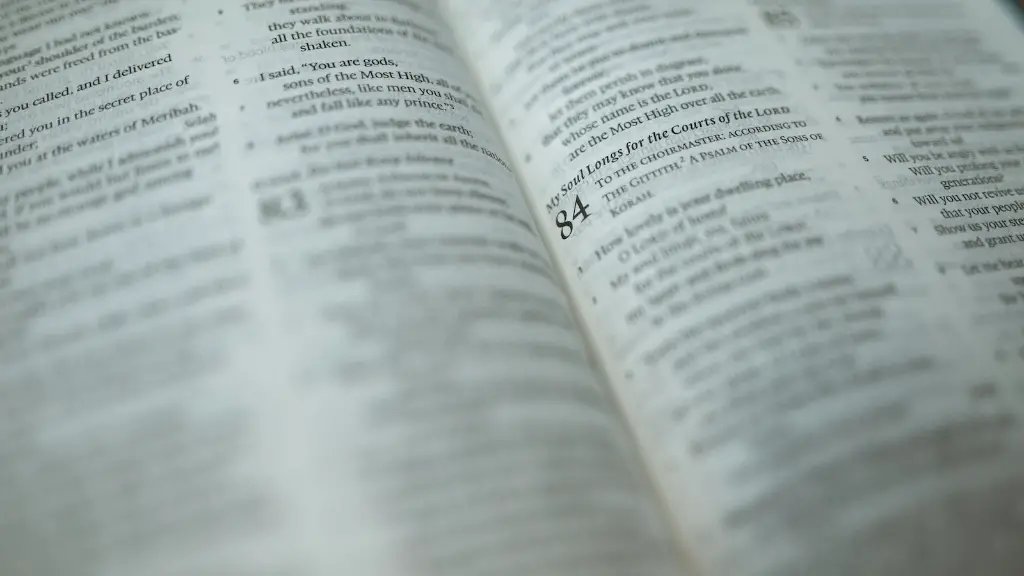The Bible is a sacred book of faith for many Christians around the world, but do Muslims read the Bible as well? It depends on what type of Muslim someone is, as it is not a set rule that all Muslims have to read or consider the Bible or have any particular beliefs when it comes to its contents.
When it comes to the Muslim faith, each adherent has the right to develop his or her own individual beliefs and to choose what books, if any, to read. Most Muslims are generally familiar with the stories and teachings of the Bible, as these stories are rooted in their faiths, but they may not choose to read it. That said, many Muslims do read the Bible, both in its entirety and in limited contexts. In fact, some Muslims believe that reading and learning from the Bible is part of the path to true understanding of God’s word and direction.
For example, it is written in the Quran that those who believe believe in the revelation that was sent down through the prophets, including the one known as the Bible. The Quran suggests that, “He has sent down the Book to you in truth confirming what was before it; and he sent down the Taurat and the Injeel.” Therefore, many Muslims choose to read or study the Bible and its teachings in order to understand the Quran better. This is because the Quran teaches that it “confirms what was before it,” which includes the Bible.
Similarly, other Muslims read the Bible out of a sense of respect for other faiths and religions. Muslims are taught to honor the teachings and beliefs of other groups and to seek wisdom in all sources they encounter. As a result, some Muslims may choose to read the Bible, even if they don’t necessarily agree with everything that it says.
At the same time, some Muslims oppose the Bible and its teachings, viewing it as nothing more than an ancient book of outdated stories. These Muslims deny its importance to the Islamic faith and may even view it as being contrary to the core teachings of Islam. Whether or not Muslims view the Bible negatively or positively, the question of whether or not they read it is one that is highly personal and based on individual beliefs.
Context
Another factor that plays into a Muslim’s view of the Bible is the context in which it is read. While some Muslims may not believe that the Bible is a legitimate source of spiritual guidance, they could still read it for its historic or cultural value. For example, there are segments of the Bible that contain stories and events that some Muslims may find inspiring or entertaining. In such cases, these stories may be read as a form of entertainment rather than spiritual reading.
Additionally, there are some Muslims who actively read the Bible as part of an academic project or research goal. These projects are often launched to explore the similarities and differences between Islamic and Christian beliefs, or to understand how Muslim history may have been impacted by the Bible’s teachings. In this case, the Bible may be treated more as a source of data or knowledge rather than a spiritual book.
In sum, the role of the Bible in Islamic belief varies greatly among individuals and depends to a large extent on the context in which it is approached. Some Muslims may believe that the Bible can help guide their understanding of the Quran, while others may view the Bible as strictly a source of entertainment or knowledge. Ultimately, only an individual can decide whether or not to read the Bible and what he or she takes away from it.
Public Perception
It is also important to consider public perception of Muslims and their views of the Bible. Some in the general public may believe that all Muslims oppose the Bible or that reading the Bible is antithetical to being a Muslim. This kind of misconception can lead to spiritual and religious alienation, as Muslims are made to feel as though they do not belong in their own communities. This is why it is important that Muslims feel empowered to develop their own beliefs in terms of how they view and approach the Bible.
Nevertheless, it is worth noting that many non-Muslims do have misconceptions about Muslims and the Bible. For example, it is not uncommon for non-Muslims to assume that all Muslims believe in the literal truth of the Bible, or that Muslims and Christians have the same beliefs about its teachings. Additionally, non-Muslims may presume that Muslims adhere to all of the Bible’s moral and ethical teachings, when this is not always the case. It is therefore important to approach such topics with an open and respectful mind.
Interpretation and Debate
Finally, it is important to note that how one interprets the Bible is open to debate and interpretation. It is common for Muslims to read the Bible and reach their own conclusions about its teachings and their implications. Additionally, many Muslims are open to discussing the Bible with Christians and accepting other interpretations and beliefs on its content. As such, there is no single, unified Muslim view of the Bible, as each Muslim’s thoughts, beliefs, and experiences may be unique.
Perhaps the most important point to remember is that the Bible is a source of faith for many people of all different faiths and backgrounds, and it could benefit us all to explore its teachings and its stories. Truly understanding and appreciating the Bible requires an open mind and a willingness to be challenged and expanded. In the end, no one has the ultimate authority on the Bible, and it is up to each individual to determine what, if any, role the Bible should play in their journey of faith.
Islam and Christianity
The two major religions of the world, Islam and Christianity, are also connected in a special way, as both religions are considered “People of the Book”. This means that both faiths look to their sacred texts, the Quran and Bible respectively, as a source of divine guidance. Muslims and Christians may draw different meanings and messages from scriptures, but both the Quran and Bible contain stories of faith, miracles, hardship, and determination that are rooted in the two religions.
In addition, the two religions have a number of shared characteristics and beliefs. For example, both Islam and Christianity teach that believers should seek knowledge, practice patience, and display kindness and mercy to others. They also share a belief in one omniscient God and that prophets have a special connection to God. These shared values and beliefs can sometimes create tensions between the faiths, but they can also create a is relationship of understanding and respect.
It is this shared divine connection that makes the Bible important to some Muslims. Reading the Bible gives them the opportunity to appreciate another values-based religion and to understand other faiths. It also allows them to explore their own beliefs and discover how they fit into the larger spiritual landscape.
Understanding the Bible
Overall, it is up to each Muslim to decide whether or not to read the Bible and what role it will play in their lives. Muslims who choose to read the Bible should remember to approach it with an open mind and an open heart, as this is the only way to truly appreciate its complexity and variety of teachings. It is also important to remember that the Bible to some Muslims is a source of insight and understanding, while it can be seen as nothing more than entertainment or cultural insight to others. Thus, it is only up to an individual Muslim to decide how to interpret and interact with the Bible and to ensure that their beliefs and behaviors are based on their own faith and knowledge.
Relationships between Muslims and Christians
When it comes to bridging the spiritual gaps between Muslims and Christians, the Bible serves as an invaluable connection. The stories, teachings, and messages of the Bible can tell us much about our differences and our similarities. Additionally, by learning about the other’s faith tradition, we can also better understand our own. Yet, even in a world of increasing secularization and decreasing religious attachment, there is still much potential for Muslims and Christians to come together and to develop a closer understanding of one another.
In order to do this, it is important to be open to different perspectives and recognize the complexity of religious life. It is also essential to remember that not all Muslims share the same views on Christianity, and not all Christians share the same views on Islam. Nevertheless, engaging in meaningful conversations and learning about each other’s religions can help bring us all closer to God, as well as to one another.
Conclusion
In conclusion, the Bible plays a complex role in Muslim beliefs. Some Muslims may choose to read the Bible, while others may consider it nothing more than an ancient collection of stories. Additionally, perceptions of the Bible vary in terms of how much truth it contains and how much value it holds. Therefore, it is important to note that it is an individual’s right and responsibility to decide how they view and interact with the Bible, and no one should be coerced into a particular belief or idea.




